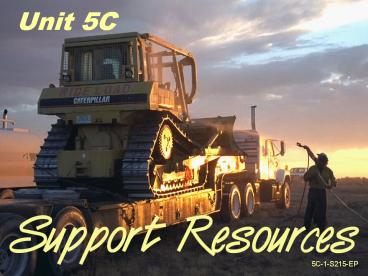Unit 5C - PowerPoint PPT Presentation
1 / 47
Title: Unit 5C
1
Unit 5C
5C-1-S215-EP
2
Unit 5C Objectives
- 1. List four ways hand crews can be used in
structure defense. - 2. List three safety considerations when aircraft
are used in structure defense. - 3. Describe hazards commonly encountered by heavy
equipmentoperations.
3
Hand Crews can be used to
- Construct handline
- Conduct site preparation
- Set up hose lays
- Support engine crews
- Conduct burn out operations
- Mop up and patrol
5C-3-S215-EP
4
ICS Hand Crew Types
- Type 1 18-20 people, experienced leadership,
highly qualified, very physically fit, inter-crew
communications, own transportation, saws - Type 2 18-20 people, varying capability
(experience, inter-crew communications,
transportation, saws and physical fitness)
5
ICS Hand Crew Strike Team
- Minimum of 36 members including crew bosses.
- May have more more than 36, but not less than.
- Generally two crews is a strike team.
6
Hand Crews
- Order crews by ICS type based on complexity of
fire. - Extensive burnout and saw work order Type I.
- Type II crews are excellent for site preparation,
supporting engine crews, and mopup. May take
longer to dispatch (emergency hires). - Check with crew boss regarding crews experience
and training. - Ensure crews have adequate transportation and
communication. - Communicate Escape Routes and Safety Zones.
7
Aircraft Operations
- Aircraft must be coordinated with ground units
in order to be safe and effective!
5C-7-S215-EP
8
Aircraft Operations
- Air Tanker Use Considerations
- Type, size, capabilities
- Availability
- Turnaround time
- MAFFS
- SEATs
5C-8-S215-EP
9
Type 1 Air Tankers3,000 gallons
Example Lockheed P-3A Orion
01-9-S270-EP
10
Type 2 Air Tankers1,800 2,999 gallons
Example Douglas DC-4
01-10-S270-EP
11
Type 3 Air Tankers800 1,799 gallons
Example Grumman S-2T
01-11-S270-EP
12
Type 4 Air Tankers (SEATs)799 gallons or less
Example Air Tractor 802
01-12-S270-EP
13
Air tankers can drop water, foam or retardant
- Use retardant to pre-treat fuels near
structures. - Slow down fire advance for attack by ground
forces. - Coordinate drops with air attack or lead planes.
- Communication with aircraft is critical for
safety. - Use caution when dropping near crews, engines or
structures.
14
Aircraft Operations
- Helicopters
- Type
- Sizes
- Capabilities
- Limitations
- Availability
- Turnaround time
5C-14-S215-EP
15
ICS Types Helicopters Based on
- Payload capability or,
- Passenger capability or,
- Gallons of retardant/water
Bell Super 205
01-15-S270-EP
16
Type 1 Helicopters700 to 2,000 Gallons
Example Sikorsky S-64 Skycrane Useful in
stopping fire spread.
5C-16-S215-EP
17
Type 2 Helicopters300 to 700 Gallons
Example Bell 412 Useful in precision dropping
around structures.
5C-17-S215-EP
18
Type 3 Helicopters100 to 300 Gallons
Example Bell 206 B-III Jet Ranger
Useful for reconnaissance.
5C-18-S215-EP
19
Fixed Wing Aircraft
- Useful in reconnaissance, supporting operations,
and air operations coordination (air tactical
group supervisor)
02-19-S270-EP
20
Aircraft Coordination
- Ensure pilots have communication with ground
forces. - Only one person should be communicating with
aircraft to direct water drops. (IAIC, DIVS or
designated ground unit). - Use large identifying landmarks to direct drops.
- Order aircraft early on, dont hesitate to order
if you need them.
21
Aircraft Operations
- Retardant and Aerial Foam
- Long term retardant
- Short term retardant
or foam - Dont drop retardant
on houses. - Effectiveness depends upon prompt follow-up by
ground forces.
03-21-S270-EP
22
Aircraft Operations
- Retardant and Aerial Foam
- None of the retardants,
foam or water, applied
from the air, can be
counted on
for total extinguishment.
- THEIR EFFECTIVENESS DEPENDS UPON
PROMPT FOLLOW-UP BY GROUND
FORCES.
23
Aircraft Operations
- Hazards
- Rotor wash and wind vortices
- The drop itself
24
Watch Out For Low Drops
03-24-S270-EP
25
If caught in retardant drop area
- Lie face down
- Hard hat (with chinstrap fastened) toward plane
- Hold tool on downhill side
Oncoming plane
03-25-S270-EP
26
Aircraft Operations
- Limiting conditions
- Power lines, wires and cables
- Wind exceeding 20 mph
- Visibility (smoke, fog, and inversions)
27
Heavy Equipment Operations
- Heavy equipment is best used to construct
fireline for control or burnout. - Heavy equipment has various capabilities and
limitations. - Heavy equipment involves unique hazards.
28
Types of Heavy Equipment
- Dozers
- Tractor plows
- Tractors with disks
- Road graders
- Construction/Logging
03-28-S270-EP
29
Type 1 Dozer (Heavy)
30
Type 2 Dozer (Medium)
5C-30-S215-EP
31
Type 3 Dozer (Light)
5C-31-S215-EP
32
Tractor Plow
5C-32-S215-EP
33
Tractor Plow
5C-33-S215-EP
34
Farm Tractor With Off-Set Disk
5C-34-S215-EP
35
Road Grader
5C-35-S215-EP
36
Feller/Buncher
5C-36-S215-EP
37
Feller/Buncher
38
(No Transcript)
39
(No Transcript)
40
(No Transcript)
41
(No Transcript)
42
(No Transcript)
43
(No Transcript)
44
Match equipment to the task
5C-44-S215-EP
45
Heavy EquipmentHazards Exercise
46
Heavy Equipment Safety
- Keep all personnel out of the vicinity of heavy
equipment while working. - Ensure that the equipment operator has required
PPE, and communications with supervisor (usually
Dozer Boss). - Provide information on identified hazards to
operator prior to beginning work.
47
Unit 5C Objectives
- 1. List four ways hand crews can be used in
structure defense. - 2. List three safety considerations when aircraft
are used in structure defense. - 3. Describe hazards commonly encountered by heavy
equipmentoperations.































